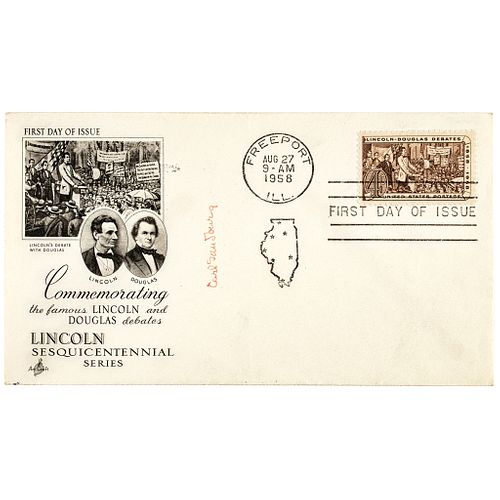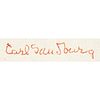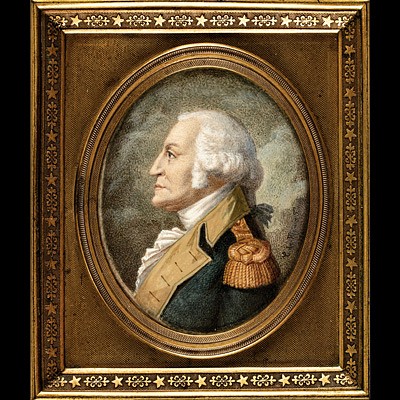CARL SANDBURG Pulitzer winning poet and biographer, signed first day cover
Lot 45
Estimate:
$200 - $250
Absentee vs Live bid
Two ways to bid:
- Leave a max absentee bid and the platform will bid on your behalf up to your maximum bid during the live auction.
- Bid live during the auction and your bids will be submitted real-time to the auctioneer.
Bid Increments
| Price | Bid Increment |
|---|---|
| $0 | $10 |
| $200 | $20 |
| $300 | $25 |
| $500 | $50 |
| $1,000 | $100 |
| $2,000 | $200 |
| $3,000 | $250 |
| $5,000 | $500 |
| $10,000 | $1,000 |
| $20,000 | $2,000 |
| $30,000 | $2,500 |
| $50,000 | $5,000 |
| $100,000 | $10,000 |
| $200,000 | $20,000 |
| $300,000 | $25,000 |
| $500,000 | $50,000 |
About Auction
By Early American History Auctions
May 22, 2021
Set Reminder
2021-05-22 12:00:00
2021-05-22 12:00:00
America/New_York
Bidsquare
Bidsquare : Autographs-Colonial-Political-Americana
https://www.bidsquare.com/auctions/early-american-history-auctions/autographs-colonial-political-americana-6913
302 Lots of Rare, Historic Autographs, Americana, Civil War Era, George Washington, Abraham Lincoln, Slavery & Black History, Revolutionary War Era, Colonial America, Federal Period, War of 1812, Colonial Currency, Indian Peace Medals & more... Early American History Auctions auctions@earlyamerican.com
302 Lots of Rare, Historic Autographs, Americana, Civil War Era, George Washington, Abraham Lincoln, Slavery & Black History, Revolutionary War Era, Colonial America, Federal Period, War of 1812, Colonial Currency, Indian Peace Medals & more... Early American History Auctions auctions@earlyamerican.com
- Lot Description
Autographs
Carl Sandburg Signed Lincoln-Douglas Debates First Day Cover Biography of Abraham Lincoln Pulitzer Prize Winner
CARL SANDBURG (1878-1967). American poet, biographer, journalist, and editor; Winner of Three Pulitzer Prizes, two for Poetry, one for his Biography of Abraham Lincoln.
August 27, 1958-Dated, Centennial Celebration Vignetted of the Lincoln - Douglas Debates, Signed, "Carl Sandburg,", Choice Extremely Fine. This First Day Postally Stamped Cover measures 6.5" x 3.5" and his signature is written at the middle of the cover in fine red ink, written perpendicular to the cover orientation. The historic vignette image captures a special commemorative event Sandburg, as Lincoln's preeminent biographer, participated in at Knox College in 1958.
Carl August Sandburg (January 6, 1878 - July 22, 1967) was a Swedish-American poet, biographer, journalist, and editor. He won three Pulitzer Prizes: two for his poetry and one for his biography of Abraham Lincoln.
During his lifetime, Sandburg was widely regarded as "a major figure in contemporary literature", especially for volumes of his collected verse, including Chicago Poems (1916), Cornhuskers (1918), and Smoke and Steel (1920). He enjoyed "unrivaled appeal as a poet in his day, perhaps because the breadth of his experiences connected him with so many strands of American life", and at his death in 1967, President Lyndon B. Johnson observed that "Carl Sandburg was more than the voice of America, more than the poet of its strength and genius. He was America."
Much of Carl Sandburg's poetry, such as "Chicago", focused on Chicago, Illinois, where he spent time as a reporter for the Chicago Daily News and the Day Book. His most famous description of the city is as "Hog Butcher for the World/Tool Maker, Stacker of Wheat/Player with Railroads and the Nation's Freight Handler,/Stormy, Husky, Brawling, City of the Big Shoulders."
Sandburg earned Pulitzer Prizes for his collection The Complete Poems of Carl Sandburg, Corn Huskers, and for his biography of Abraham Lincoln (Abraham Lincoln: The War Years). Sandburg is also remembered by generations of children for his Rootabaga Stories and Rootabaga Pigeons, a series of whimsical, sometimes melancholy stories he originally created for his own daughters.
The Rootabaga Stories were born of Sandburg's desire for "American fairy tales" to match American childhood. He felt that the European stories involving royalty and knights were inappropriate, and so populated his stories with skyscrapers, trains, corn fairies and the "Five Marvelous Pretzels".
In 1919, Sandburg was assigned by his editor at the Daily News to do a series of reports on the working classes and tensions among whites and African Americans. The impetus for these reports were race riots that had broken out in other American cities. Ultimately, major riots broke out in Chicago too, but much of Sandburg's writing on the issues before the riots caused him to be seen as having a prophetic voice.
A visiting philanthropist, Joel Spingarn, who was also an official of the National Association for the Advancement of Colored People, read Sandburg's columns with interest and asked to publish them, as The Chicago Race Riots, July, 1919.
Sandburg's popular multivolume biography Abraham Lincoln: The Prairie Years, 2 vols. (1926) and Abraham Lincoln: The War Years, 4 vols. (1939) are collectively "the best-selling, most widely read, and most influential book[s] about Lincoln." The books have been through many editions, including a one-volume edition in 1954 prepared by Sandburg.
Sandburg's Lincoln scholarship had an enormous impact on the popular view of Lincoln. The books were adapted by Robert E. Sherwood for his Pulitzer Prize-winning play Abe Lincoln in Illinois (1938) and David Wolper's six-part dramatization for television, Sandburg's Lincoln (1974).
He recorded excerpts from the biography and some of Lincoln's speeches for Caedmon Records in New York City in May 1957. He was awarded a Grammy Award in 1959 for Best Performance - Documentary Or Spoken Word (Other Than Comedy) for his recording of Aaron Copland's Lincoln Portrait with the New York Philharmonic. Some historians suggest more Americans learned about Lincoln from Sandburg than from any other source.
The books garnered critical praise and attention for Sandburg, including the 1940 Pulitzer Prize for History for the four-volume The War Years. But Sandburg's works on Lincoln also brought substantial criticism.
William E. Barton, who had published a Lincoln biography in 1925, wrote that Sandburg's book "is not history, is not even biography" because of its lack of original research and uncritical use of evidence, but Barton nevertheless thought it was "real literature and a delightful and important contribution to the ever-lengthening shelf of really good books about Lincoln." Others criticized Sandburg's failure to document sources and factual errors. Others complain The Prairie Years and The War Years contain too much material that is neither biography nor history and is instead "sentimental poeticizing" by Sandburg.
Sandburg may have viewed his book as an American epic more than as a mere biography, a view mirrored by other reviewers as well.
Our Auction Contents:
Black History & Slavery: (Lots 1 - 63)
Abraham Lincoln Related: (Lots 64 - 74)
Historic Autographs: (Lots 75 - 235)
Colonial America: (Lots 236 - 261)
Revolutionary War: (Lots 262 - 304)
George Washington Related: (Lots 305 - 306)
Early American Guns & Weapons: (Lots 307 - 318) - Shipping Info
-
Early American provides in-house worldwide shipping. Please contact us directly if you have questions about your specific shipping requirements.
-
- Buyer's Premium



 EUR
EUR CAD
CAD AUD
AUD GBP
GBP MXN
MXN HKD
HKD CNY
CNY MYR
MYR SEK
SEK SGD
SGD CHF
CHF THB
THB













